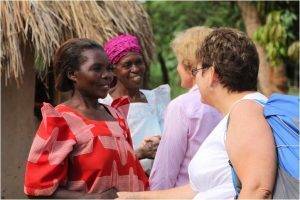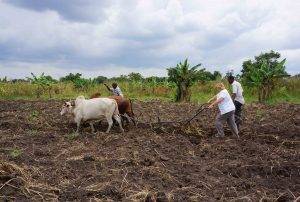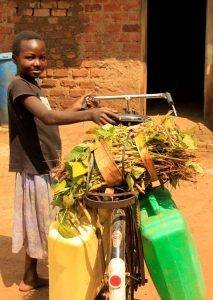 Guest blog by
Guest blog by
April Hemmes, Hampton, Iowa
 When asked to join the 2011 Iowa /Uganda Farmer-to-Farmer Exchange, I jumped at the opportunity. I’ve been raising row crops and beef cattle in Franklin County since I graduated from Iowa State, and so I understand first-hand some of the challenges women face as farm operators.
When asked to join the 2011 Iowa /Uganda Farmer-to-Farmer Exchange, I jumped at the opportunity. I’ve been raising row crops and beef cattle in Franklin County since I graduated from Iowa State, and so I understand first-hand some of the challenges women face as farm operators.
I was eager to learn about the challenges facing Ugandan farmers in general – and women farmers in particular – and this trip has been quite eye-opening to say the least. There are so many differences between our two countries and our two cultures. For starters, the entire country of Uganda is slightly larger than the state of Iowa. But Uganda has a population of 34 million people as compared to Iowa with just 3 million! When we tell the Ugandans there are more hogs than people in Iowa, they laugh.
 The average farm size is 4 acres in Uganda, but we met one very successful woman who has 250 acres. This is a lot of work considering it is all done by hand. I have yet to see one tractor or even an ox plow.
The average farm size is 4 acres in Uganda, but we met one very successful woman who has 250 acres. This is a lot of work considering it is all done by hand. I have yet to see one tractor or even an ox plow.
 This lack of equipment creates some challenges for farmers to get their product to market. For example, Tuesday we visited the Kamuli Mill. Farmers bring their white corn here where it is either sold directly to the mill or ground.
This lack of equipment creates some challenges for farmers to get their product to market. For example, Tuesday we visited the Kamuli Mill. Farmers bring their white corn here where it is either sold directly to the mill or ground.
There are also middlemen involved because many farmers don’t have a way to transport  grain to the mill. In order to afford hired transportation, a farmer must have large enough quantities of grain. A farmer could receive better prices if the grain gets transported to a larger market. That’s why I’m working on a project to help farmers market collectively for better prices.
grain to the mill. In order to afford hired transportation, a farmer must have large enough quantities of grain. A farmer could receive better prices if the grain gets transported to a larger market. That’s why I’m working on a project to help farmers market collectively for better prices.
It’s hard to believe that I only have four more days here! The farmers we have met in Uganda have been so appreciative of our help. They’re especially appreciative of everyone who is making this exchange possible. The 2011 Iowa /Uganda Farmer-to-Farmer Exchange and development project is coordinated by the Iowa State University Extension and  Outreach Global Program, in collaboration with the Center for Sustainable Rural Livelihoods (CSRL) in the College of Agriculture and Life Sciences at ISU, and VEDCO, a non-profit organization based in Uganda. The project is funded by the United State Agency for International Development (USAID) through Weidemann Associates.
Outreach Global Program, in collaboration with the Center for Sustainable Rural Livelihoods (CSRL) in the College of Agriculture and Life Sciences at ISU, and VEDCO, a non-profit organization based in Uganda. The project is funded by the United State Agency for International Development (USAID) through Weidemann Associates.
